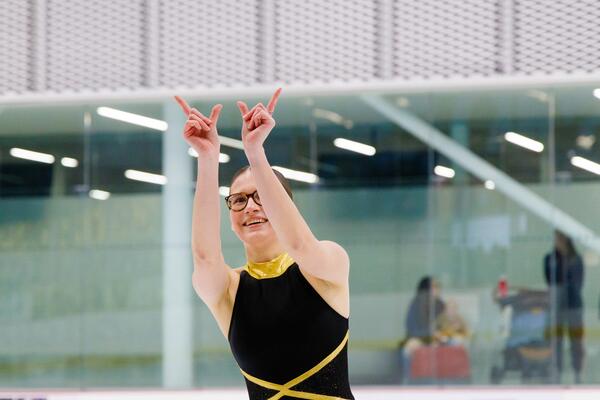
Varsity swimmer honoured for academic and athletic achievements
Aidan Iapicco receives the Environment Student-Athlete Award in recognition of excelling in sport and studies

Aidan Iapicco receives the Environment Student-Athlete Award in recognition of excelling in sport and studies
By Chantal Vallis Faculty of EnvironmentBalancing rigorous academics with the demands of varsity athletics is no small feat, but Aidan Iapicco has mastered the art of diving into both.
The fourth-year undergraduate student in the School of Environment, Resources and Sustainability is the recipient of this year’s Environment Student-Athlete Award, which recognizes his dedication and achievements in both sport and studies.

Iapicco was recruited to the University of Waterloo in 2020 to compete on the varsity swim team and joined with a goal of learning more about protecting the Environment. Along the way, his passion for environmental research, specifically water resource management and biogeochemistry deepened.
“It makes sense that I have an interest in water,” he says. “It started when I had to write a systems report for one of my classes. So, I decided to do it on the Great Lakes natural system. I then got a job with the Federal government. I worked on Lake Ontario, Lake Simcoe and Lake of the Woods nutrients team to deliver programs to reduce phosphorus and nitrogen in freshwater bodies.”
It was opportunities like these that propelled him to volunteer in the Biogeochemistry Lab. This summer he will be joining the lab full time to gain more experience analyzing water samples, learning in depth how the lab instruments work and collecting new data and evidence to help prioritize and target conservation efforts for watershed planning.
But Iapicco’s story doesn’t begin in the lab—it starts in the pool. A competitive swimmer for 14 years, he first started the sport after his mother enrolled him in lessons, emphasizing water safety following the 2011 earthquake and tsunami in Japan. What started as a practical skill quickly became a lifelong pursuit, one which has allowed him to compete in regional competitions as well as Olympic trials.
“Swimming is not just a sport to me. It has made me who I am today and has taught many different life lessons” he says, but notes managing a rigorous training schedule alongside coursework required an intense level of discipline. One that he had to hone upon coming to Waterloo.
“It was a really big transition coming into university because, it’s nothing like high school. But I got some help from the Varsity Wellness Coordinator, Marshall Bingeman. He taught me how to organize my schedule and tips to cope with stress.”
Time management became Iapicco’s greatest tool. “The fact that I don’t have the same amount of time made me stay focused,” he explains. By structuring his schedule around his swim commitments, he ensured he stayed ahead on assignments.
Receiving the Environment Student-Athlete Award is more than just a financial boost—it’s a recognition of his hard work and dedication.
“This award really helps me. It helps my mom. She has been my sole supporter through my academics and athletics. It relieves stress from her.”
Most importantly, the award is a big confidence boost. He acknowledges the self-doubt that many students face are ones that he has grappled with as well.
“Throughout my academics, I always struggled and thought I didn’t belong. That was a big barrier coming into university. But this has proven that I can do it. I hope others will also apply and know that they are good enough to be considered for this award.”
For Iapicco, the journey doesn’t stop here. He hopes to continue his studies in the Faculty of Environment and pursue a master’s degree focusing on Biogeochemistry in hopes for future work in ocean conservation. Long-term, he also envisions launching a startup that applies his environmental expertise to real-world challenges.
As Iapicco works to wrap up his degree and athletic pursuits, he is a testament to the power of perseverance, passion, and the willingness to take the plunge.
The Environment Student-Athlete Award recognizes students who through the pursuit of both sports and studies, become resilient leaders and problem solvers with an awareness of social and sustainability issues. The award is made possible by Environment alumni and donors, with special thanks to seed donor, alumni Derek Coleman (PhD ’74), for his initial investment.
Photo credit: Joe Rousseau

Read more
Reka Somogyi receives the Environment Student-Athlete Award in recognition of excelling in sport and studies

Read more
Here are the people and events behind some of this year’s most compelling Waterloo stories

Read more
Twenty-six researchers receive federal funding to drive discovery, innovation and research infrastructure development
The University of Waterloo acknowledges that much of our work takes place on the traditional territory of the Neutral, Anishinaabeg, and Haudenosaunee peoples. Our main campus is situated on the Haldimand Tract, the land granted to the Six Nations that includes six miles on each side of the Grand River. Our active work toward reconciliation takes place across our campuses through research, learning, teaching, and community building, and is co-ordinated within the Office of Indigenous Relations.